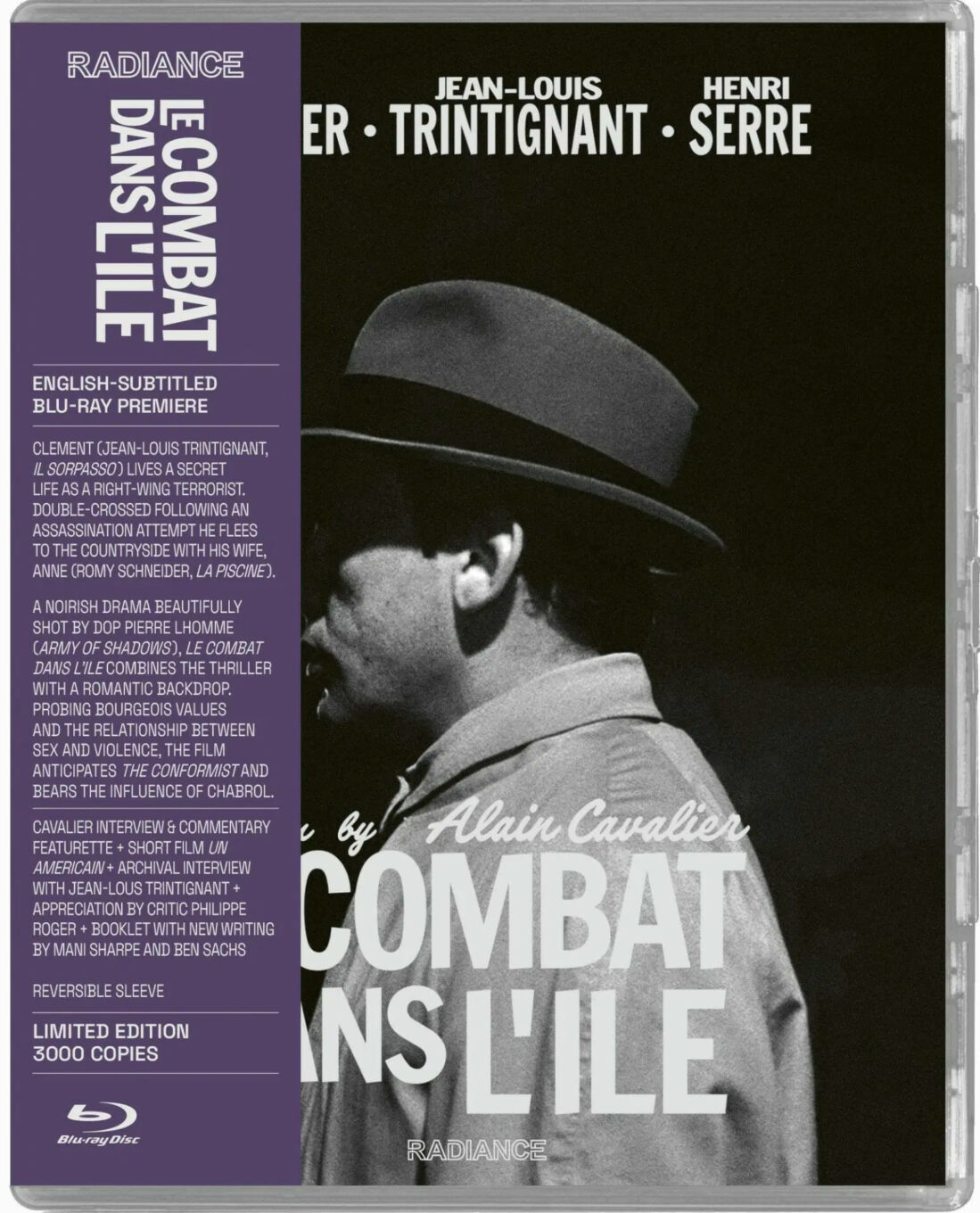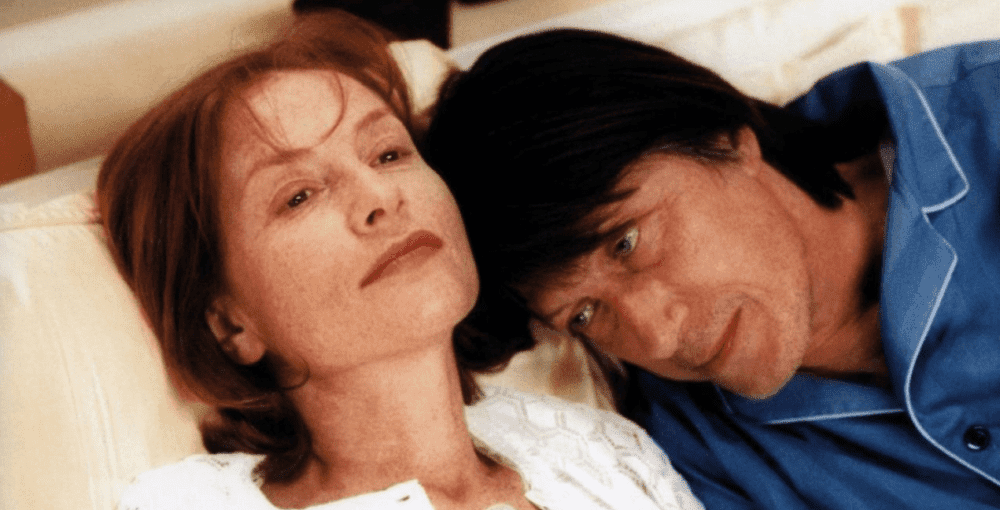The French New Wave movement changed up the attitude filmmakers had about making movies. This band of former film critics typed up scripts and hired cinematographers to make their own movies. They didn’t work their way up the ladder. They proved you didn’t need the Hollywood Studio system to make your movie. This group of filmmakers were revolutionary in their attitude and movies. There is an issue with figuring out who was really a part of the The French New Wave movement. Claude Chabrol, François Truffaut and Jean-Luc Godard are considered core, but people argue about the inclusion of Louis Malle, Chris Marker and Agnès Varda. What about Alain Cavalier? He made a short film in 1958 when the movement got rolling, but went on to assist Louis Malle make his films. His first feature film Le Combat Dans L’ile (translated to The Fight On The Island) has all the markings of a French New Wave film with great black and white imagery, a very French-cnetric attitude and a plot that refuses to be lumped into one genre. He’s not making a Hollywood movie. Le Combat Dans L’ile keeps us guessing as to what crisis will bring the film to an end.
Clément Lesser (Death Laid An Egg‘s Jean-Louis Trintignant) and his wife Anne (What’s New Pussycat?’s Romy Schneider) are having a late night hanging out with Serge (Lucky Jo’s Pierre Asso). Clement’s the son of a rich industrialist and a bit right wing which makes him pals with Serge. Serge keeps talking about his Hunting Club that Clement is supposed to visit that weekend. Anna has given up her dreams of acting to become a full-time wife and understanding to her husband’s needs. What she doesn’t know is that Serge’s Hunting Club is not about shooting wildlife. This is a right-wing militia training ground for taking out communist leaders. Clement is being trained to assassinate a leader under the tutelage of Serge. This isn’t a normal sniper hit. Clement is armed with a bazooka so there’s no change of missing his target. The night he takes out his leader, he grabs Anna and they hit the road to lay low for a while. He ends up at a countryside bed and breakfast kind of place run by Paul (Jules et Jim‘s Henri Serre). His old pal has no clue that he’s harboring a right-wing assassin. Although Clement gets word that he’s more of a vandal since he was set up by someone at the Hunting Club to be the Patsy. He decides to leave Anna and hit the road to get revenge. Instead of turning into a full-fledged political thriller, Anna takes over a chunk of the narrative. After waiting a few months and sensing Clement is never coming home, she gets back to acting. She turns her attention to Paul. What will she do if her husband comes back to France?
Is Le Combat Dans L’ile a French New Wave film? Besides have Louis Malle as the producer, we get the star of François Truffaut’s Jules Et Jim. That film is considered a French New Wave masterpiece and was made around the same time. Cavalier even gets Jean-Pierre Melville to make an appearance. Melville is pretty much the father of the New Wave as the director was nurturing to the aspiring filmmakers. The style and substance of the film fits nicely with the work of other movies coming out of France at the time. The film has three different genres wrapped into a wonderful bundle. First you get the hitman movie as Clement trains to be a killer. The second is a political film that deals with the idea of a rich kid like Clement taking out his anger on the lower classes by killing their leaders. It’s also a bit political in the relationship between Clement and his working-class buddy Paul. This leads to the Anna get her groove back storyline. She recaptures so much of her life that has been suppressed while married to Clement. Can he accept her new life after he deserted her? There’s a lot going on in Le Combat Dans L’ile. Yet Cavalier doesn’t lose control as everything masterfully collides at the end.
If Alain Cavalier isn’t considered French New Wave by your international Cinema teacher, he deserves to be considered New Wave Adjacent with Le Combat Dans L’ile.

The Video is 1.66:1 anamorphic. This means you’ll see black bars on the sides of your TV screen. The 2K Restoration from the original camera negative. The black and white imagery looks sharp. The Audio is LPCM 2.0 Mono in French. The sound is clear. The movie is subtitled in English.
Interview with Alain Cavalier (4:51) from French television show Cinema page in 1962. He talks about his influences being found in paintings, people eating and the countryside more than cinema. He was Louis Malle’s assistant which is how the director came to produce this film.
Faire la mort (4:46) has Cavalier talking about scenes in the film including the death scenes.
Interview with star Jean-Louis Trintignant (7:36) from the Belgian television show Cinescope in 1983. He talks about the movie and they show clips. He talks about working with Romy Schnieder since they made 3 more movies together.
The Succulence of Fruit (37:29) has French critic Philippe Roger discuss the film and Cavalier’s work. He gets deep into how the director set himself apart from the first film by not making a precise genre film. It’s not merely criminal or political. There’s also a relationship film on the screen.
Un américain (16:38) is Cavalier’s first short film. An American artist comes to Paris and finds adventures as he gets inspired.
France 1961 (13:15) is a short film made by Cavalier for a previous DVD release. He shows off photos taken during the production and shares his memories. This is very French. He goes into how he cast the performers.
Gallery has 9 Behind-the-scenes photos including images from the archive of Louis Malle.
Trailer (3:22) opens with the gun being loaded, but gives us glimpses of his complicated romance at the heart of the film.
Limited edition booklet featuring new writing on the film by critic Ben Sachs and Mani Sharpe.
Radiance Films presents Le Combat Dans L’ile. Directed by Alain Cavalier. Screenplay by Alain Cavalier & Jean-Paul Rappeneau. Starring Romy Schneider, Jean-Louis Trintignant, Henri Serre, Diane Lepvrier, Robert Bousquet, Jacques Berlioz, Armand Meffre & Jean-Pierre Melville. Running Time: 104 minutes. Rating: Unrated. Release Date: November 28, 2023.





